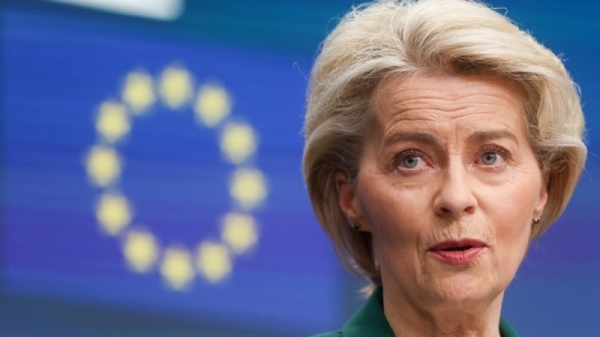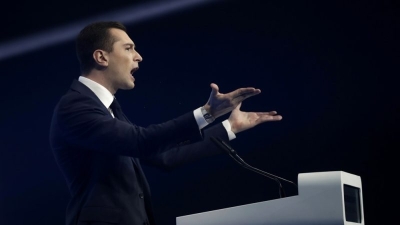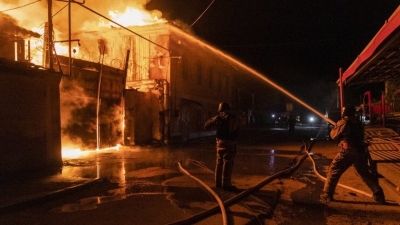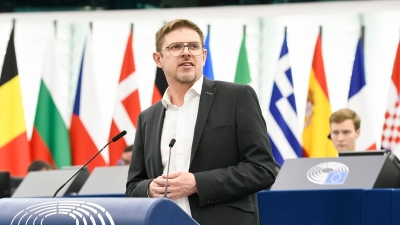Von der Leyen to seek third-country migration deals during Hungary’s EU Council presidency

The much-controversial steady deployment of partnerships with countries of origin and transit is next in the EU leaders’ plan to reduce migration influxes, now, the European Parliament has ratified a large-scale reform on how the bloc will deal with migrants internally.
While the Parliament ratified the Asylum and Migration Pact on Wednesday (10 March) amidst division and fears, the bloc’s plan to combat migration is far from complete.
Aside from the complex two-year implementation period, now that internal migration management has been addressed, EU leaders want to boost efforts to finalise agreements with neighbouring states in North Africa and the Middle East to slow the influx of incoming migrants.
If current Commission President Ursula von der Leyen secures another term as expected, it will be one of her main priorities despite backlash from EU Parliament groups and civil society.
“In parallel [to the Migration Pact implementation], we will also press ahead with our work partnerships with countries of origin and transit so that we can address the root causes of migration together,” von der Leyen said right after the law was passed, next to Belgian Prime Minister Alexander De Croo and Parliament President Roberta Metsola, supported her words.
“This engagement has become an essential pillar of our work, and it is deliberate,” she added.
So far, the EU has concluded agreements with Tunisia, Mauritania, and Egypt, which involve large sums of money to help countries control migration flows.
Hungary will help
Starting in July, Hungary’s EU Council presidency will be in charge of brokering agreements between EU countries and defining the policy agenda. Budapest is also interested in continuing to work on tackling the issue at the external borders and in third countries via such deals.
Two diplomats said that could take the shape of more deals over the months after June’s EU elections, starting with Morocco or Turkey, but looking at the southern neighbourhood as a whole, too.
Some officials have also mentioned including Sahel countries if the region becomes more stable.
However, these deals have been criticised by left-wing forces, as well as some liberals and part of the centre-right European People’s Party (EPP), who do not consider Egypt and Tunisia as countries that guarantee respect for human rights.
Rwanda-style deals?
Meanwhile, the European People’s Party (EPP), the political family of Metsola and von der Leyen, has pledged in their electoral manifesto to go one step further and adopt the UK’s controversial Rwanda model, whereby asylum seekers are sent to third countries for application processing, and following the decision.
Italy and Albania concluded an agreement in late 2023 that will see migrants processed in the Western Balkan country before being moved to Italy or sent home after their applications are decided on. While this agreement differs from the ‘Rwanda model,’ it has led to other countries, including Austria, saying they may consider similar ideas.
At the same time, the EPP is also pledging to increase the EU’s border authority, Frontex, from 2,000 to 10,000 staff to crack down on border control.
“We will continue to bring them [EU countries] tailored solutions on border management,” von der Leyen said, and added: “We must be the ones to decide who comes to the European Union and under what circumstances, and not the smugglers and traffickers.”
Backlash from EU Parliament groups
During a press conference before the Parliament voted on the migration Pact, the law’s leading negotiators slammed the Commission’s deals with third countries.
“Throwing money at dictators is not migration policy,” liberal MEP Sophie in’t Veld said, adding that it will just keep the dictators in place for longer and make the problem bigger.
Along the same lines, Renassaince’s MEP Fabienne Keller said, “The agreements with origin countries are indispensable, we need to dialogue (…), but the deals with Egypt and Tunisia are not the right model.”
“[These deals] are against the European values, to be frank. Are we helping the people, or are we helping the regime? Are they fully aligned with the human rights values? I don’t think so,” Socialist MEP Matjaz Nemec said, echoing concerns from Green and Left lawmakers.
“So it’s going to be a big challenge for us, European Parliament, to reopen this kind of debate in the next term,” he added.
Read more with Euractiv




